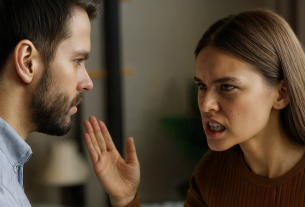Dima had wanted to be a doctor for as long as he could remember. But life, it seemed, was determined to test him. First came the sudden death of his father — a blow that shattered the ground beneath him. Then his mother’s health began to fail, worn down by nerves and the grind of working two jobs. Naturally, he failed his medical entrance exams. And now, for the second year in a row, he worked as an orderly at the regional hospital, still clinging to the hope that one day he might wear the white coat.
That morning had been ordinary — cleaning, moving patients, rushing endlessly along sterile corridors. But after lunch, the head of the therapeutic department, Andrey Pavlovich, unexpectedly called him in.
“Dima, I have a delicate request,” the doctor began, studying him. “There’s a patient — Lidiya Semyonovna. Very ill. She has a grandson, also named Dima. Only… they haven’t seen each other in years. She wants nothing more than to see him before she goes. We were thinking… maybe you could take his place. Just once. For her peace of mind.”
Dima froze. Pretend to be someone else? Lie to a dying woman?
“I don’t know… it doesn’t feel right,” he murmured.
“Sometimes a lie can be an act of kindness,” the doctor said softly. “Think about it. It will be her final comfort — and your small gift.”
The image of a lonely old woman waiting for her beloved grandson wouldn’t leave him. At last, he nodded. The nurses quickly filled him in on the real Dima — childhood hobbies, favorite phrases, scraps of a life he would need to imitate. And so began a strange performance for an audience of one.
That evening, drained after the conversation, Dima stopped by the store for bread and milk for his mother. On the way home, he unexpectedly ran into Marina — the lively, sun-bright girl from the next building. Her smile had always undone him.
“Hi, Dima! Where have you been hiding?” she teased.
They talked easily — about a new film, about nothing in particular — until he impulsively asked if she’d like to go together. To his amazement, she agreed.
“Saturday. Perfect,” she said.
On the walk home, he was smiling for the first time in days. Maybe this was the start of something — a new page in his life, a chance at happiness.
The next day, after his shift, he stepped into Lidiya Semyonovna’s room. His heart pounded — what if she saw through him? But the frail woman with the bright, searching eyes looked at him for a long moment and whispered:
“Dimochka… you came, dear…”
Relief washed over him. She believed. They spoke easily, almost naturally, about life and the past, even death — which she regarded without fear.
He began visiting daily — bringing water, adjusting her pillow, simply sitting with her. Once, she asked if he had a girlfriend. Dima thought of Marina, blushed.
“Tell me later how the date goes,” she smiled. “I still like hearing about love.”
But Saturday didn’t unfold as he’d hoped. After the movie, they strolled through the park until Marina’s voice turned serious.
“You’re a good guy, Dima. Really. But we’re different. I want to travel, build a career… and you… you’re an orderly. It matters, but it’s not for me.”
She didn’t need to finish — he understood. His life, his uncertain future, had built a wall she wouldn’t cross.
When he came home, his mother asked how it went.
“Nothing came of it,” he said shortly.
She sighed, clearly displeased with his “grandson” role at the hospital.
“Other people’s hopes can be heavy, Dima. Don’t carry more than you can bear.”
Her words deepened the ache left by Marina’s rejection. Still, the next day he went to see Lidiya Semyonovna. She spotted his mood instantly.
“What happened, grandson? Did the girl hurt you?”
He told her everything. She listened, then said:
“Love isn’t about the one who shines, Dimochka — it’s about the one who warms.”
From her bedside table, she drew an old photo album.
“Take this. My son, Alexey — your father. Keep these memories. I don’t need them anymore.”
Her voice trembled. Dima knew it was goodbye — not just to her, but to some part of himself.
At home, he opened the album. A young man with an open smile stared from faded photos. In one university group picture, a familiar face stopped him cold — his mother, younger, smiling.
His chest tightened. They had known each other. His mother and Alexey. But why had she never said so? Why hide it?
Questions roared through his mind. He had to know. Now.
He leapt up and headed out. Passing the doctors’ lounge, voices drifted through the half-open door. He recognized Andrey Pavlovich.
“…yes, we’ll increase the dose gradually — no one will suspect a thing. We’ll blame it on a natural decline. She has a tidy inheritance, and this so-called grandson is already impatient for her to ‘rest in peace.’”
Then came another voice — sharp, unpleasant, amplified through a loudspeaker:
“Act decisively, Pavlovich. I’m sick of the delays. The old woman’s time has long run out.”
Dima’s blood froze. A conspiracy. They were planning to speed up her death — his own grandmother’s — all for an inheritance. Panic rose in his chest, but fear had no place now. He had to act.
He tore out of the hospital like a shot, heart pounding, and sprinted home. Bursting into the apartment, he shoved a photo under his mother’s nose.
“Mom, who is this? Who is Alexey really?”
She looked at the photograph, then at her son’s pale, trembling face. Color drained from her own cheeks, and words spilled out as if a dam had burst.
Alexey had been her first and only love. They had planned to marry, but his mother, Lidiya Semyonovna, was firmly against it. She wanted her son to marry “above his station,” not a simple girl from the outskirts.
When his mother became pregnant, Alexey offered to leave home to protect her from the family’s contempt. But tragedy struck before they could build a life — he died in an accident when Dima wasn’t yet a year old. Left without money or support, she had been forced to place her baby in an orphanage temporarily while she searched for work and the strength to start over.
She had written to Lidiya Semyonovna, begging her to acknowledge her grandson, but the grieving, prideful woman never replied.
As his mother spoke, Dima felt his old world crumble, replaced by a shocking new reality: Lidiya Semyonovna was his real grandmother — and now someone wanted her dead.
“Mom, we have to save her,” he said firmly.
That night, when the hospital corridors had fallen silent, Dima and his mother slipped into Lidiya Semyonovna’s room. She was frail, but her mind was clear.
“Dimochka… and who’s with you?” she whispered, noticing the woman at his side.
“Lidiya Semyonovna… it’s me, Katya,” his mother said, her voice trembling. “You don’t remember? I loved your Alyosha… And this is your grandson. Your real grandson — Dima.”
In minutes, they poured out everything: the past, the conspiracy, the danger. The old woman’s eyes widened in disbelief before filling with tears.
“My dear grandson… and you, Katyenka…”
But there was no time for sentiment.
“Grandma, we have to go. Now,” Dima urged.
They quickly packed a few belongings, gently lifted her from the bed, and slipped out through the service exit, where a taxi waited. The whole ride, she held Dima’s hand as if afraid to lose him again.
That night was both frantic and miraculous — a woman who had lost her family regained it, and two generations separated by years of silence were reunited.
Months later, Andrey Pavlovich and his accomplice were under investigation, thanks to the testimony of a nurse who had trusted Dima enough to speak out.
In Dima and his mother’s modest apartment, Lidiya Semyonovna slowly recovered, surrounded by the love and care she had been denied for decades. For the first time, Dima understood what “family” truly meant.
Evenings became warm rituals: his grandmother telling stories about his father, showing photos from a childhood he had never known; his mother, lighter now that her secret was gone. Dima finally saw the face of the man who had always been just a distant, half-whispered memory.
One day, the phone rang. Marina’s name lit up the screen.
“Hi, Dima,” she said hesitantly. “I was thinking… maybe we could meet?”
Dima smiled faintly.
“Sorry, Marinachka. My life is different now.”
And it truly was. He had found someone new — Katya, a medical college student, who asked for nothing but to be by his side.
Evenings at home were filled with warmth: his mother fussing over tea, his grandmother telling funny stories, Katya’s gentle gaze meeting his across the table. Dima looked at them all and felt something deeper than any dream he had chased — real happiness.
No, he wasn’t a doctor yet, and the white coat still hung untouched in his closet. But he now knew that purpose wasn’t just a career — it was the people who loved you.
He was no longer the lost boy of yesterday. He had become steady, strong, and ready to meet each new day with hope, love, and an open heart.



